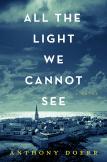Lost Youth
Anthony Doerr has previously published four books—one nonfiction, one novel and two story collections. His collection Memory Wall in particular helped him stand out from the crowds of writers; it was strange, magical and bold. He has won a number of awards, which is always partly a matter of luck, but he deserved them. His newest book, another novel, takes place primarily during World War II, the main characters a German boy and a blind French girl who spend less than a day together. Its title, All the Light We Cannot See, may suggest that we are all largely or often blind, or that light surrounds us even as we are unaware, or that somewhere else there is more light and we may yet see that promising more.
For long sections, chapters about the boy (Werner) and the girl (Marie-Laure) take turns, which brought to my mind Haruki Murakami’s 1Q84, in which chapters are divided between a young lady and a young man. In 1Q84 that arrangement allowed the book to accumulate enormous suspense. But it fizzled at the end, when the reader learned that all the obstacles that kept the two apart were merely an instance of true love not running smoothly. One thousand pages were thereby trivialized.
The same device in Doerr’s novel, however, works, both because he does not hold to it so rigidly and because the novel is historical fiction. The obstacles Marie-Laure and Werner face are not mere fantasies of the author; they are the kinds of loss, confusion and horror that real people really encounter in war.
Nevertheless, for the first 18 pages I fretted. The writing seemed a bit unsteady, as if the author were standing on a chair to do it. Images came and went rather too quickly, as Dorothy said soon after she arrived in Munchkinland: “My! People come and go so quickly here!”
But on page 19 we meet Marie-Laure’s father, controller of all the keys to the National Museum of Natural History (as many as 12,000 of them), and take a headlong dive into the story, which is mysterious, complex, rich with diverse and full characters and written with what must be love. Daniel LeBlanc’s fearless love and affection for his daughter are utterly convincing, and there must be other readers who wish they’d had him for their dad, as did I. Alas, he is taken off a train to parts unknown, perhaps a work camp, perhaps a concentration camp. Marie-Laure is now living in a fabulously narrow and tall building in Saint-Malo with her uncle, Étienne, who, having endured World War I, remains frozen with terror until the need to care for his niece causes him to recover his courage.
We have also met Werner Pfennig, a very small youngster with ears that stick out and white hair, who is intellectually gifted and dreams of escaping work in the mines, the normal occupation for poor boys in his town (his father died in a mine accident). He longs to study math, physics and mechanical engineering. Bright as he is, he learns a good deal about these matters on his own. He and his younger sister, Jutta, listen to radio broadcasts on the receivers he has been able to acquire and fix up. Later, having been conscripted into the Hitler Youth and then the Nazi Army, he will be assigned to track down and destroy illicit radio sets in various countries. Jutta will also play an important part before the book ends.
These children are marvelously described. They come immediately to life, and we share their dreams, disappointments and struggles to survive and thrive. By the time some of them are remembering their youth, we are remembering it with them, in vivid detail that can be both pleasurable and excruciating. That the young grow old is both a joy and a sadness, we all know, but when we can, through a book, experience that journey, similar to yet profoundly different from our own, we have enlarged our world.
But it is war, and not everyone gets to grow old. At the school at Schulpforta, for example...
one hundred and nineteen twelve- and thirteen-years-olds wait in a queue behind a truck to be handed thirty-pound anti-tank landmines, boys who, in almost exactly one year, marooned amid the Russian advance, the entire school cut off like an island, will be given a box of the Reich’s last bitter chocolate and Wehrmacht helmets salvaged from dead soldiers, and then this final harvest of the nation’s youth will rush out with the chocolate melting in their guts and overlarge helmets bobbing on their shorn heads and sixty Panzerfaust rocket launchers in their hands in a last spasm of futility to defend a bridge that no longer requires defending.
There are many charged moments here: The cancer-stricken but threatening German, Sergeant Major von Rumpel, who seeks a “cursed” diamond called the Sea of Flames, tracks Marie-Laure to Étienne’s house; Werner and his devoted friend Volkheimer are trapped in the cellar of the Hotel of Bees without food, water or light; drunken, madly victorious Russian troops rampage and rape; a sweet, bird-watching boy, with whom Werner bunked at a military school, becomes one of many ill-fated, heartrending casualties. I shamelessly cried through scenes of pitiable devastation and feel I would do so again if I were to reread All the Light We Cannot See.
This article also appeared in print, under the headline “Lost Youth,” in the Sept. 1-8, 2014, issue.








